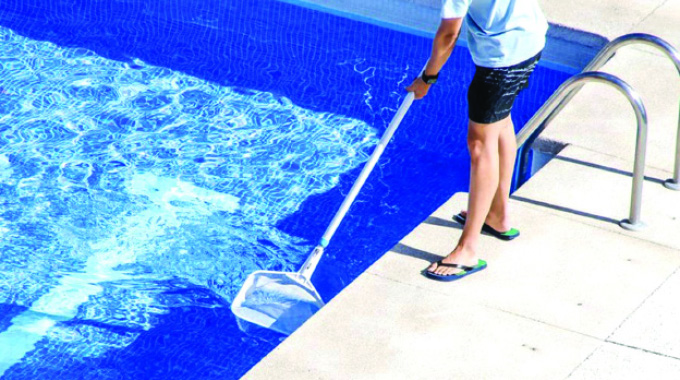Pool maintenance tips that will keep you happy this summer

Wouldn’t it be nice if you could just jump in and enjoy? All types of pools are big investments that require regular maintenance in order to remain in use.
Neglecting to keep up with your pool maintenance can cost you thousands of dollars in damages, and ultimately render your pool unsafe to swim in.
Here are sustainable pro-tips to keep you happy, and keep your pool under control all summer long.
Vacuum Your Pool for Dirt and Debris
This may seem obvious, but simply taking the time to clean your pool will go a long way. From a sanitary perspective, keeping the surface of your pool dirt-free prevents you from getting an infection. Indoor carpet and hardwood vacuums work very similarly to pool vacuums. Vacuuming your pool can easily and quickly remove debris and algae, the same way you clean up inside your home.
Professionals recommend thoroughly cleaning your pool at least once a week. In addition to vacuuming, you should brush your pool’s walls, steps and floors to remove dirt and debris, and skim the water’s surface and pool floor to remove leaves and other items.
Maintain the Water Levels
Many people may overlook the importance of maintaining the water levels in their pool. Allowing your pool’s water levels to rise or drop can actually throw off the chemical balance in the water. If your water isn’t maintained at the appropriate level, it could also cause your water skimmers and filters to have a harder time keeping your pool clean.
Clean Your Pool Filter
Cleaning your pool’s filter is one-third of the equation (which includes circulation, filtration and chemistry) to a perfect pool. The frequency in which you clean your pool filter depends on how often you use it.
There are indicators to look out for that will tell you it’s time to clean your filter. Some warning signs include abnormal pool odour, clogged drain and inefficient hose cleaner. If your pool has a cartridge filter, depending on its size, you will need to clean it from as often as monthly to as infrequently as every four to six months.
If your pool has a DE (diatomaceous earth) filter, it should be completely disassembled and cleaned every three to six months. Backwashing, the task of reversing the flow of water through your filter, should also occur monthly to partially clean the filter between the seasonal full service. This particular action dislodges debris that may have become trapped inside the filer and flushes it out safely.
If you have a sand filter, the start of a pool season is the perfect time to refresh the sand. Sand typically should be replaced every three to five years, or when water quality starts to suffer. Like DE filters, sand filters should also be backwashed at least monthly to partially clean the filter from debris.
Keep an Eye on the Water Chemistry
Homeowners should make it a priority to maintain proper water chemistry. He says improper water chemistry, or corrosive water, can cause damage to pool surfaces, pool equipment, pool decks and bathers.
Have your pool water tested bi-weekly by a local pool professional. Recommendations should be taken seriously, and adjustments should be made per the instructions given by the hired professional.
If you have a concrete pool surface, definitely think twice before using saline. Saline pools are less stable and algae build-up is common which means you’d still need to “shock” the pool from time to time with a combination of acid and chlorine.
Monitor the Chlorine
The magic number is 3 parts per million (ppm) of chlorine in your pool. He says it’s completely fine to add in extra tablets after an event or if you are heading away for a couple of weeks.
Once you’re in or near the pool, if a strong smell and itchy eyes don’t convince you of high chlorine levels then you can use a home test to be sure.
Contrary to popular belief, chlorine does not immediately kill germs. However, no matter what type of chemical concentration you choose, you will still need chlorine. Even saltwater pools need chlorine. Chlorine is the most notable, and most reliable cleaning solution for pools. It also won’t discolour your pool surface the way that saltwater will, and chlorine won’t erode your plumbing.
Create a Pool Cleaning Schedule
It can be hard to keep track of all the things you need to do in order to stay up to date with your pool maintenance. Since swimming pools must be maintained regularly, creating a schedule is an easy way to make sure it always gets done. Brian Smith, founder of Outside How, suggests incorporating your pool into your regular summer cleaning schedule. Being consistent with your cleaning can help afford not only infections, but accidents too.
Depending on how frequently you use your pool, or where it is located, your pool could call for daily cleaning. The degree of cleaning varies, and can be as simple as removing fallen leaves or the day’s debris.
Pick one day a week to vacuum and clean the tiles and clean the filter at least once every season.
Create a pool cleaning schedule, including every aspect of maintenance, add it to your to-do list and enjoy your summer. – Forbes.com






Comments